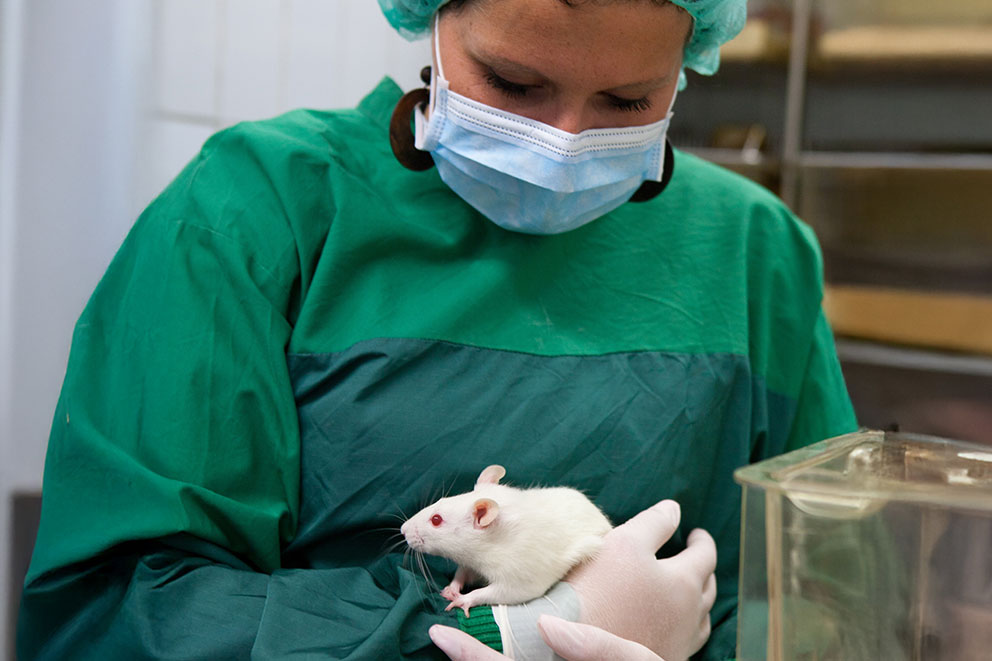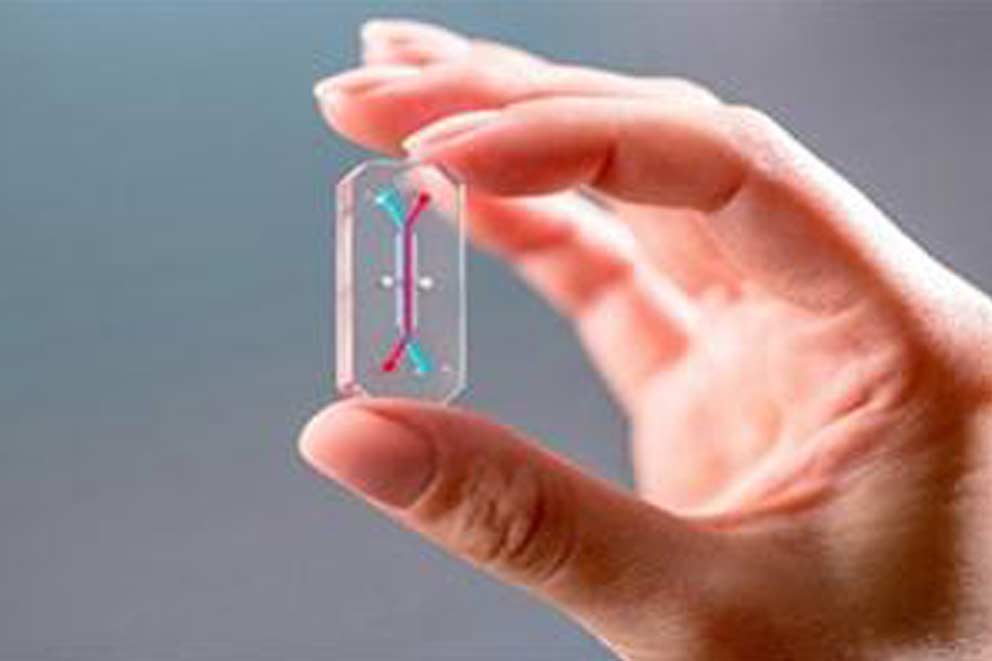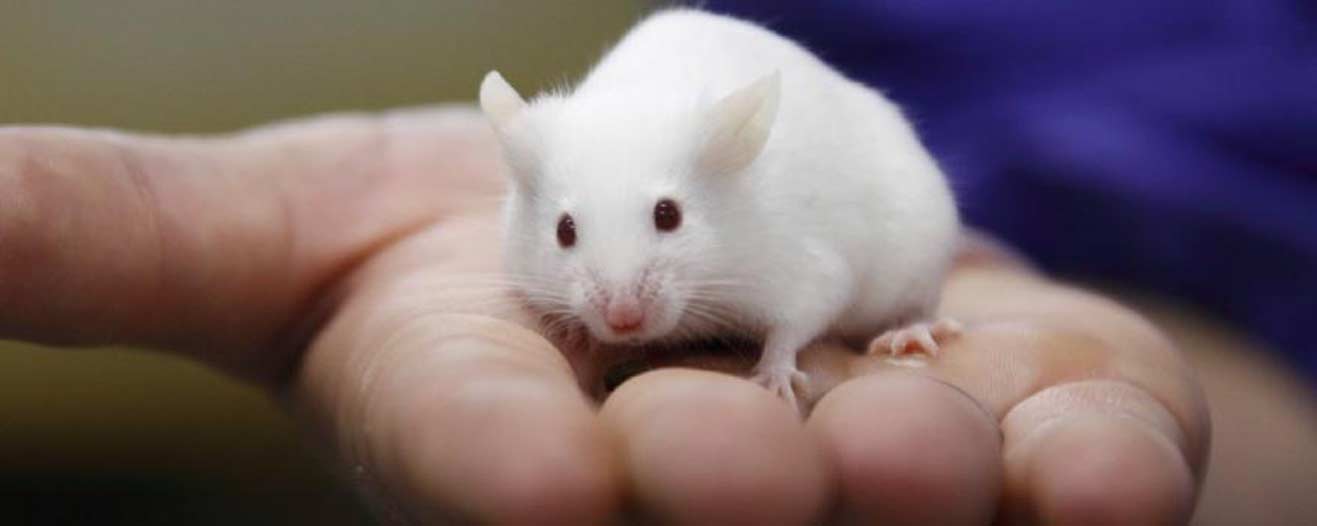Lab animals
We're opposed to scientific procedures that cause animals pain, suffering, distress or lasting harm. Our goal is the worldwide replacement of all animals in research and testing with humane alternatives.

In the meantime, we work to:
- improve the welfare of laboratory animals
- reduce their suffering
- keep the number of animals used to a minimum
- encourage the development and take-up of non-animal alternatives.
We work with laboratories, regulators, funders and governments, in the UK and internationally, to challenge and influence animal use. We believe we can make a bigger difference this way, both now and in the future.
We challenge whether animals should be used for a particular purpose and how they’re being used. We promote practical ways of avoiding or reducing the suffering of lab animals. We challenge the ethics and beliefs around the use of animals. And we run workshops and conferences and produce well-respected guidelines, reports and training.
In the meantime, we work to:
-
Improve the welfare of laboratory animals
-
Reduce their suffering
-
Keep the number of animals used to a minimum
-
Encourage the development and take-up of non-animal alternatives.
We work with laboratories, regulators, funders and governments, in the UK and internationally, to challenge and influence animal use. We believe we can make a bigger difference this way, both now and in the future.
We challenge whether animals should be used for a particular purpose and how they’re being used. We promote practical ways of avoiding or reducing the suffering of lab animals. We challenge the ethics and beliefs around the use of animals. And we run workshops and conferences and produce well-respected guidelines, reports and training.
Lab animal use today
It's estimated that more than 100 million animals are used in research and testing around the world each year, including around 2.6 million in the UK. This number would be much higher if it included animals who are bred but then killed without ultimately being used in an experiment, or those who are killed for their organs and tissues.
These include mice and rats, macaques and marmosets, zebrafish, chickens, frogs, beagles, cats, and animals commonly farmed including, cattle, pigs and sheep. Around three-quarters of animals used in the UK are mice, closely followed by zebrafish and rats.
In the late 1990s, the UK banned the use of animals to test cosmetics products, as well as their ingredients where these are only used in this type of product. The ban now also covers the sale in the UK of cosmetics produced in other countries that have been tested on animals.
However, animals are still used for research and testing:
- To help us understand how animal and human bodies function
- To study medical conditions such as cancer or Alzheimer’s
- To develop and test medicines and vaccines – for humans and animals (including our pets and farm animals)
- To assess the impact of chemicals used in products such as pesticides or paints on our health and the environment.
They’re also used for research into conditions such as obesity or drug addiction, where pharmaceuticals aren’t the only option, and conditions such as male pattern baldness that many people argue don’t need ‘treating’ at all. Animals may also be used to help answer questions, such as how birds navigate when flying.
Each procedure has its own scientific, animal welfare and ethical issues. We strongly encourage a review of these at all stages of a lab animal’s life.
Our key concerns
These are our key concerns about the use of animals in research and testing:
- The animals can and do experience pain and distress and this can cause severe suffering.
- There’s serious debate, including among scientists themselves, about how useful many animal experiments are.
- There’s much talk of making sure that the highest possible standards of animal welfare are met, but laboratories may do little or nothing above the minimum laid out in law.
- Some experiments are badly designed or poorly carried out – this wastes an animal’s life and causes suffering that could have been avoided.
We have a lot of influence
By working with the scientific community and regulators, we can improve the lives of animals being used in research and testing while working towards a phase-out of animal use. We work in the UK, in Europe and internationally. Our science-based approach is well respected and opens doors.
Here are some examples of how we work to get ‘buy-in’ to our goals of reducing animal suffering and replacing lab animal use with non-animal alternatives:
- We visit laboratories that use animals to discuss ethical and welfare issues with the scientists and animal care staff.
- We meet with MPs, senior civil servants and other government officials including Ministers.
- We work to directly influence scientists and people who care for animals in labs.
- We sit on animal welfare and ethics committees.
- We get experts together to encourage open and honest debate.
- We run meetings, workshops and training and produce resources such as videos, guidelines and reports.
We support the 3Rs
The 3Rs are recognised around the world as a means of encouraging more humane research and testing on animals.
- Replacement – adopting methods that avoid or replace animal use.
- Reduction – making sure the minimum number of animals is used to answer the scientific question.
- Refinement – finding ways to reduce suffering and improve animals’ lives.
Although we work towards all three, our main goal is replacement – phasing out the use of lab animals altogether through developing alternatives such as ‘organs-on-a-chip’.
FAQs
-
Since the late 1990s, it’s been illegal in the UK to use animals to test cosmetics products and the ingredients in them. It’s also illegal to sell cosmetics in the UK if they or any of their ingredients have been newly tested for this purpose using animals outside the UK. Unfortunately, animals are still used to test cosmetics in some other countries, but the number who have now banned this continues to grow.
-
You could make a donation to the RSPCA. This will help us do more towards protecting animals currently used in research and testing, and support our work on phasing out the use of animals in scientific procedures.
You can also get involved and make your voice heard. Email your MP to express your concerns and to call for the UK Government to become a world leader in developing and promoting humane alternatives to lab animal use. -
Although it’s not common, some laboratory animals are rehomed in certain circumstances. We support this when it’s in an animal’s best interests. The animals most commonly rehomed are dogs, cats and horses.
Rehoming opportunities aren’t often advertised to the public and rehoming is often done internally, for example to staff or students working in a university that uses animals for research. Some animal welfare organisations may rehome lab animals such as beagles. -
We do not believe that all scientific procedures using animals are necessary, nor that they are always done only as ‘a last resort’.
Animal experiments are one of the traditional approaches to studying how human and animal bodies work and for testing medicines and chemicals. This is permitted by law, providing scientists who use animals can make a case that there’s currently no other way to achieve the scientific objectives and that any pain or distress caused to the animals is justified by the potential ‘benefits’ of the research.
Procedures can range from looking at an animal’s behaviour and taking blood samples, to carrying out surgery and creating animal ‘models’ of, for example, arthritis or depression. Animals are also used for research into how the chemicals we use, such as cleaning products or e-cigarettes, will affect humans, other animals or the environment.
We believe that animal use in research and testing should be phased out to stop causing animals pain, suffering and distress. There is already a range of humane alternatives to animal use available and work is continuing on developing more as technology improves. These include the use of human cells, which may be more effective in many cases than using animals, who can react differently to humans.
Every animal experiment raises its own ethical, animal welfare and scientific issues. Good ethical review considers many issues when weighing up whether to go ahead with new scientific projects, including:- What alternative approaches there areto solving the problem
- How useful an experiment will be
- The design of the experiment
- The welfare of the animals who will be used.
Poorly designed experiments, or those done without adequate care, also waste animals’ lives and cause unnecessary suffering and distress. -
There’s no doubt that animals can experience pain and distress as a result of being used in experiments. Scientific procedures using animals are classified as causing ‘mild’, ‘moderate’ or ‘severe’ suffering. Although these categories aren’t the whole story.
Animals may undergo a number of mild procedures and together these can add up to them experiencing higher levels of suffering. When their welfare needs aren’t met, animals kept in laboratories can suffer in other ways, including poor handling, housing and care. When you take into account an animal’s whole life experience, their suffering may be severe.
There are many opportunities for reducing fear, discomfort, pain or distress, and part of our work is developing and promoting these. For example, we hold regular events where people share new ways of reducing suffering and improving welfare for lab animals. Our main aim, though, is for animal use to be phased out entirely and replaced with humane alternatives. -
Yes. In 2024, 1,936 scientific procedures were performed on non-human primates in the UK.
Under UK law, non-human primates are classed as ‘specially protected species’, along with dogs, cats and horses. Researchers wanting to use specially protected species for research and testing have to show that no other species could be used to answer that specific scientific question. They must also follow additional conditions, such as keeping individual history files on animals.
We understand why many people are particularly concerned about the use of monkeys, including for example, because of the stress involved in how these animals are often bred and transported to research facilities, which can include long journeys from other countries. But all lab animals are capable of experiencing suffering and we're equally concerned about all of them. -
Yes. In 2024, 2,646 scientific procedures were performed on dogs in the UK.
Dogs are classed as ‘specially protected species’, along with non-human primates, cats and horses. Researchers wanting to use specially protected species for research and testing have to show that no other species could be used to answer that specific scientific question. They must also follow additional conditions, such as keeping individual history files on animals.
Many people are deeply concerned about dog use because of the very close relationship between humans and their pets. We understand this, but we're equally concerned about all lab animals as they're all capable of experiencing suffering. -
A number of non-animal technologies are already available and making a difference. But, unfortunately, there’s a long way to go before animal use is phased out completely.
Humane alternatives have many uses including investigating how cancers spread, testing drugs, and researching diseases such as arthritis and Covid-19. Current technologies include isolating human cells to mimic organs in our bodies, and predictive computer modelling based on decades of testing results. Some tests can be done on human volunteers (see below). We also encourage thorough ethical review to decide if a project needs to be done at all.
At the end of 2025 the UK Government launched a new national strategy aimed at replacing the use of animals in science. It contains many of the actions we have long called for, and if properly implemented should make a positive difference in speeding up the transition away from animal use. -
Some research and testing can use human volunteers or patient groups with their informed consent. An example is investigating the effectiveness of a treatment that is already known to be safe. Studies such as assessing the safety of new drugs and chemicals, or studying the ways bodies work, would be harmful to human volunteers.
-
Under the Animals (Scientific Procedures) Act 1986, laboratory animals are housed and cared for according to guidance laid out in the Code of practice for the housing and care of animals bred, supplied or used for scientific purposes.
This sets out information on:- Facilities – such as the size of cages or enclosures and bedding provided
- Environmental conditions – such as temperature and lighting
- Feeding and watering
- Routine veterinary treatment
- Handling of animals
- Enrichment provided – such as nesting materials for rodents or toys for dogs.
There are specific legal guidelines for each species used in labs. Each establishment may (and should) also have their own guidelines for the housing and care of laboratory animals that go ‘above and beyond’ the legal requirements.
We believe that all animals are individuals who should be kept in housing that meets their needs. We call for laboratories to improve on minimum legal requirements and to work to improve the lives of research animals.
-
The number of animals used in research and testing is currently going down in Great Britain. According to the latest Home Office figures, in 2024 there were 2.64million scientific procedures involving living animals carried out in Great Britain.
This is a decrease of 2% from 2023 and the lowest number since 2001.
Despite this fall, there are still around 2.6 million animals used in laboratories in the UK each year, and more than 100 million worldwide. We are working hard to champion the global replacement of animal experiments with humane, non-animal alternatives. -
Yes we do. It’s important to note though that we have no legal power to ‘inspect’ laboratories but are invited by scientists and researchers. Because of our strong working relationships with many people and organisations involved in lab animal use, we can influence and promote our views ‘from the inside’. This makes us unique among other non-governmental organisations working in this area.
-
In the UK, the use of animals in experiments is regulated by the Animals (Scientific Procedures) Act 1986. This is enforced by the Home Office through its Animals in Science Regulation Unit.
Under the ASPA 1986 law, all breeding and use of animals in science has to be carried out in licensed premises. The research itself has to be set out in a project licence application, which is submitted to the Home Office for authorisation. The people carrying out the research also have to be licensed.
Find out more
Areas of animal use
Laboratory animals are used in several different settings, including:
- Medicine - developing and testing medicines and vaccines for humans or animals
- Research - studying how animal and human bodies function
- Safety testing - assessing the safety of chemicals, such as pesticides, for their possible effects on human health or the environment.
Lab animals in the UK
It's estimated that more than 100 million animals are used in experiments each year across the world. Attitudes to animals, and the legislation in place regarding their use and welfare, vary widely between countries.
In the UK, the use of animals in experiments is regulated by the Animals (Scientific Procedures) Act 1986 - which is administered by the Animals in Science Regulation Unit of the Home Office.
Under this law, all breeding and use of animals has to be carried out in licensed premises. The research itself has to be set out in a project licence application, which is submitted to the Home Office for authorisation, and the people carrying out the research also have to be licensed.
Our view on lab animals
We believe that the necessity and justification for using animals should always be critically reviewed and that everything possible must be done to speed up the development of humane alternatives. Until then, every possible step should be taken to reduce the number of animals used, and to significantly reduce their suffering and improve their welfare.
Follow us on X
Keep updated on our work to help lab animals @RSPCA_LabAnimal.




